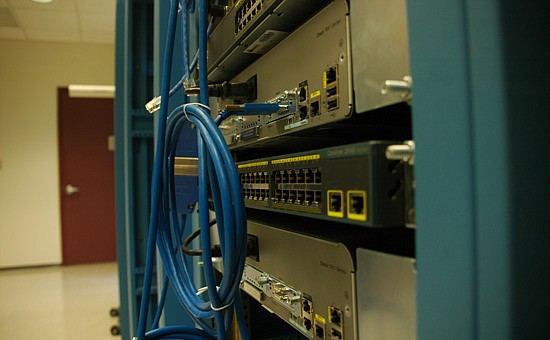- April 26, 2024
-
-
Loading

Loading

Just as national security is in the spotlight in the wake of the Edward Snowden affair, Seminole State College is launching new degree tracks in homeland and network security starting this fall. The classes arrive at a time of fear and distrust for many Americans of the National Security Agency – raising questions of how the students will respond to the incoming classes.
Students will now be able to choose classes geared toward security, with the homeland security track going toward the Associate in Science degree in criminal justice technology and the network security track going toward the Bachelor of Science degree in information systems technology.
The new homeland security degree track will give students a general understanding of how the country responds to national threats, including an introduction to terrorism and criminal justice, said Jim Lee, the associate dean of Seminole State College’s Center for Public Safety.
“I think it can assist any public safety first responder, as well as members of other government agencies in simply becoming familiar with the national response framework and the national incident management system,” Lee said.
“This allows them to become familiar with why the system was created and what it’s in place for.”
The basic knowledge would also have various applications within the defense industry, Lee said
“Everyone is affected by the need to be aware and respond to a domestic security threat.”
One of the most recent events that shook the American people’s sense of security came from within a government agency, when technical contractor Edward Snowden leaked information from the National Security Agency (NSA) regarding phone tapping and Internet surveillance.
The leaks raised concerns among Americans not only for their own privacy, but for their safety, especially if the information went into the hands of terrorists.
“Those who wish us harm now know how we counter their actions,” said NSA Director Gen. Keith Alexander during the AFCEA International Cyber Symposium in Baltimore, Md. “These leaks have caused significant and irreversible damage to our nation’s security.”
Lee would not comment on the NSA leak or whether it would be discussed in the new courses.
The three new courses offered in the college’s new network security degree track would give students a foundation in enterprise, mobile and cloud security, teaching them how to protect signals coming from mobile devices and keeping servers secure within a business.
“This definitely is a stepping stone to some of the things that the FBI and some of the defense industry folks would want,” said Associate Dean Lenny Portelli of the Information Technology department.
Portelli believed that the controversy surrounding the NSA leak would spark interest and boost participation in the classes, and that the students in the program would be drawn to courses that teach ways to make information databases safer.
“I think it elevated the fact that there needs to be more security, and I think if anything it probably would attract students to wanting to get into that,” Portelli said. “I would think that there would be an even bigger push by the government to come up with ways to secure it, and so I think from a job opportunity standpoint there could be something there for that.”
But students at the University of Wisconsin were far less than enthusiastic when two NSA recruiters visited the school earlier this month.
What started as a typical Q&A session became an interrogation when student Madiha Tahir responded to a recruiter’s comment about monitoring “adversaries.”
“Do you consider Germany and the countries that the NSA has been spying on to be adversaries or are you, right now, not speaking the truth?” said Tahir, who recorded the session and posted it online.
The heated discussion continued to flare up as other students claimed that the NSA was spying on the American people, and that Snowden had done the right thing.
Though some students may be opposed to joining the defense industry, the information technology field has a number of different areas for them to choose from, Portelli said.
“Some may not be intrigued by it, but if they’re not, that’s OK, because there’s other options for them out there, many other options,” Portelli said.
Portelli noted that as long as the country leaves intelligence in the hands of people, there will always be a risk of information being leaked, and that the recent NSA leak raises even more questions of how to be sure someone is trustworthy.
“Maybe it talks to the fact that there needs to be another level of security to be able to access very sensitive data,” Portelli said. “Maybe that’s true, but somebody has to access that data eventually. You would think that with a person whose background has been thoroughly investigated that that’s not going to be a problem.”
“In the end, it’s going to come down to a person who needs to be trusted.”